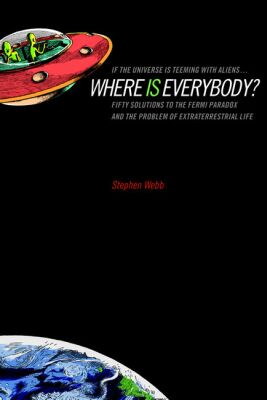

| If the Universe is Teeming with Aliens... WHERE IS EVERYBODY? Fifty Solutions to the Fermi Paradox and the Problem of Extraterrestrial Life Stephen Webb New York: Copernicus Books, 2002 |
Rating: 5.0 High |
|||
| ISBN-13 978-0-387-95501-8 | ||||
| ISBN 0-387-95501-1 | 288p. | HC/BWI | $27.50 | |
You're probably wondering. So am I.
So, famously, was Enrico Fermi in the summer of 1950. A brilliant physicist, Fermi won the Nobel Prize in 1938 and escaped fascist Italy to become instrumental in the success of the Manhattan Project that unleashed the power of the atom. He was known for asking his students questions like "How many piano tuners are there in Chicago?" — questions that forced them to draw on their life experience as well as knowledge of physics. There is no exact, complete and final answer to such a question; you must make some initial assumptions (which is where the life experience comes in) and use them as the basis of a reasonable estimate.
"How many intelligent, communicative civilizations are there in the galaxy today?" is just such a question. It must have been on Fermi's active mind when, in the middle of an unrelated conversation at lunch, he burst out with "Where is everybody?"1 But his colleagues knew what he meant: If the universe is as it appears — teeming with life, some of it intelligent, and if interstellar travel is possible — then why aren't they here? This is the essence of the Fermi Paradox. Its resolution lies in the future.2 For the moment, it's still open season on speculation. One of the most complete and cogent examinations of how it might be resolved is this book by physicist Stephen Webb. Webb ticks off the proposed resolutions one by one, and dismisses most of them. (I can't say "demolishes" since, as he frequently points out, there is little hard data at present for most of them.) It is a stimulating, multidisciplinary journey, drawing on physics, geology, sociology, evolutionary biology, and linguistics as well as that real-life experience.
Webb has certainly done his homework, and he knows his science fiction. He writes well, explains the scientific bits clearly, and I like the way he thinks. I enjoyed the book, and I recommend it. But I must say it is a downer. For in the end, against his own confessed bias, Webb concludes that the reason for the Great Silence is that we as a species are unique — and quite alone.
The famous French biologist Jacques Monod wrote that "evolution is chance caught on the wing." Even more evocatively, he wrote that "Man at last knows he is alone in the unfeeling immensity of the universe, out of which he has emerged only by chance." It is a melancholy thought. I can think of only one thing sadder: if the only animals with self-consciousness, the only species that can light up the Universe with acts of love and humor and compassion, were to extinguish themselves through acts of stupidity. If we survive, we have a Galaxy to explore and make our own. If we destroy ourselves, if we ruin Earth before we are ready to leave our home planet ... well, it could be a long, long time before a creature from another species looks up at its planet's night sky and asks: "Where is everybody?" |
Just for the record, though he argues persuasively, I don't accept his conclusion.
There are some typos, some grammar errors, and a few bad descriptions. I list those on the errata page, linked below. Some of the astrophotographs are poorly reproduced. But in the main, this is a well-produced book — thoroughly annotated and indexed, with 218 citations. Well worth reading and buying.

 To contact Chris Winter, send email to this address.
To contact Chris Winter, send email to this address.